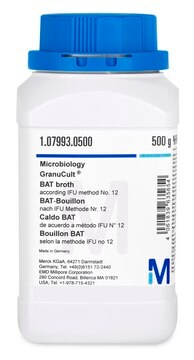1.07994
GranuCult® BAT agar
pkg of 500 g, according to IFU 12, for Alicyclobacillus spp.
Synonym(s):
Alicyclobacillus selective agar, Bacillus acidoterrestris agar
About This Item
Recommended Products
Agency
according to IFU 12
Quality Level
sterility
non-sterile
form
granular
packaging
pkg of 500 g
manufacturer/tradename
GranuCult® prime
storage condition
protect from light (both UV and Sun light)
technique(s)
microbiological culture: suitable
application(s)
food and beverages
microbiology
storage temp.
15-25°C
suitability
Alicyclobacillus spp. (spp.)
General description
GranuCult® BAT agar contains glucose as a carbon and energy source. Yeast extract is the source of vitamins, particularly the B-group. Potassium dihydrogen phosphate acts as a buffering system. The low pH and the high incubation temperature inhibit the contaminating flora. This medium contains many trace elements, which supply the specific requirements of the Alicyclobacillus spp. agar is the solidifying agent however, the gel strength is weak due to low pH.
Application
Analysis Note
Appearance (color): yellowish
pH-value (25 °C): 3.9 - 4.1
Growth (Alicyclobacillus acidocaldarius DSMZ 446): +
Growth (Alicyclobacillus acidoterrestris DSMZ 2498): +
Growth (Alicyclobacillus cycloheptanicus DSMZ 4006): +
Growth (Alicyclobacillus hesperidium DSMZ 12766): +
Growth (Staphylococcus aureus ATCC 25923 (WDCM 00034)): -
Growth (Escherichia coli ATCC 25922 (WDCM 00013)): -
Incubation: A.acidocaldarius 72 hrs.; 60 °C aerobic; other strains 72 hrs.; 45 °C.
Reference for Staph.aureus und E.coli blood agar (Incubation: 24 hrs.; 35 °C).
Footnote
The designations basic, plus, or prime are added to indicate the quality control level, from basic quality control to standard QC plus to prime for full regulatory compliance.
Legal Information
Storage Class Code
11 - Combustible Solids
WGK
WGK 3
Regulatory Listings
Regulatory Listings are mainly provided for chemical products. Only limited information can be provided here for non-chemical products. No entry means none of the components are listed. It is the user’s obligation to ensure the safe and legal use of the product.
EU REACH Annex XVII (Restriction List)
Certificates of Analysis (COA)
Search for Certificates of Analysis (COA) by entering the products Lot/Batch Number. Lot and Batch Numbers can be found on a product’s label following the words ‘Lot’ or ‘Batch’.
Already Own This Product?
Find documentation for the products that you have recently purchased in the Document Library.
Articles
The different types of culture media, that are used to grow microorganisms in the laboratory for quality control, are classified by several criteria, such as consistency, composition, or selectivity.
New microbiological standards for fruit juices focus on detecting Alicyclobacillus spp. using BAT broth and agar.
Related Content
Alicyclobacillus are acidophilic, strictly aerobic, and spore-forming spoilage bacteria that can cause increased turbidity, color changes and unpleasant sensory properties in juices. Testing is performed according to IFU method No 12 (2019).
Our team of scientists has experience in all areas of research including Life Science, Material Science, Chemical Synthesis, Chromatography, Analytical and many others.
Contact Technical Service








